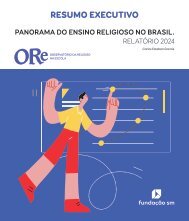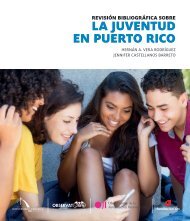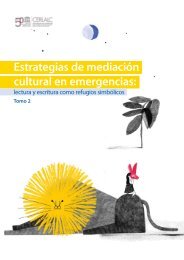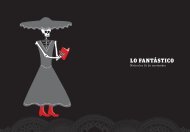Informe PISA 2018 BRASIL (EN)
El Programa para la Evaluación Internacional de Estudiantes (PISA) es una encuesta trienal dirigida a estudiantes de 15 años que evalúa en qué medida han adquirido los conocimientos y habilidades fundamentales para participar plenamente en la sociedad.
El Programa para la Evaluación Internacional de Estudiantes (PISA) es una encuesta trienal dirigida a estudiantes de 15 años que evalúa en qué medida han adquirido los conocimientos y habilidades fundamentales para participar plenamente en la sociedad.
Create successful ePaper yourself
Turn your PDF publications into a flip-book with our unique Google optimized e-Paper software.
8 | Brazil - Country Note - <strong>PISA</strong> <strong>2018</strong> Results<br />
What School Life Means for Students’ Lives<br />
How is the school climate in Brazil?<br />
• In Brazil, 29% of students reported being bullied at least a few times a month, compared to 23% on<br />
average across OECD countries. At the same time, 85% of students in Brazil (and 88% of students on<br />
average across OECD countries) agreed or strongly agreed that it is a good thing to help students who<br />
cannot defend themselves.<br />
• Some 41% of students in Brazil (OECD average: 26%) reported that, in every or most language-ofinstruction<br />
lessons, their teacher has to wait a long time for students to quiet down. In Brazil, students<br />
who reported that, in every or most lessons, the teacher has to wait a long time for students to quiet<br />
down scored 19 score points lower in reading than students who reported that this never happens or<br />
happens only in some lessons, after accounting for socio-economic status.<br />
• On average across OECD countries, 21% of students had skipped a day of school and 48% of students<br />
had arrived late for school in the two weeks prior to the <strong>PISA</strong> test. In Brazil, 50% of students had<br />
skipped a day of school and 44% of students had arrived late for school during that period. In most<br />
countries and economies, frequently bullied students were more likely to have skipped school, whereas<br />
students who valued school, enjoyed a better disciplinary climate and received greater emotional<br />
support from parents were less likely to have skipped school.<br />
Figure 5. School climate<br />
Notes: Only countries and economies with available data are shown. (1) In every or most language-of-instruction lessons; (2) Very or extremely true;<br />
(3) Agreed or strongly agreed.<br />
Source: OECD, <strong>PISA</strong> <strong>2018</strong> Database, Tables III.B1.2.1, III.B1.3.1, III.B1.4.1, III.B1.8.1, III.B1.8.2 and III.B1.9.1<br />
• Some 83% of students in Brazil (OECD average: 74%) agreed or strongly agreed that their teacher<br />
shows enjoyment in teaching. In most countries and economies, including in Brazil, students scored<br />
higher in reading when they perceived their teacher as more enthusiastic, especially when students<br />
said their teachers are interested in the subject.<br />
• In Brazil, 48% of students reported that their schoolmates co-operate with each other (OECD average:<br />
62%) and 57% reported that they compete with each other (OECD average: 50%).<br />
© OECD 2019 Volumes I-III

















